New urbanization should focus on people's needs


China will advance its people-centered new urbanization through concrete measures, according to a five-year action plan unveiled on Wednesday by the State Council, China's Cabinet.
The country plans to support more rural migrant workers in settling down in urban areas and aims to lift the urbanization rate of permanent residents to nearly 70 percent within five years, the action plan said.
China's urbanization rate of permanent residents stood at 66.16 percent by the end of 2023, a marked rise from 53.1 percent by the end of 2012, and a total of 165 million countryside residents have moved to cities and towns through the country's household registration system in the past decade.
The country will implement targeted measures in two key types of areas. In regions with low urbanization rates and large populations, the focus will be on enhancing the level of urbanization, while in areas with relatively high urbanization rates and continuous population agglomeration, the goal will be to cultivate modern metropolitan areas, the action plan said.
All relevant measures outlined by the action plan involve the core interests of the new urban residents after they move to the city from the countryside and touch various issues of public concern in a systematic way.
"People-centered" means that the urbanization construction must be based on the fundamental purpose of meeting the people's growing needs for a better life; and "new" refers to not only new public infrastructure, but also urban industrial upgrading, green development and, more importantly, the protection of people's rights and interests so that people have comparatively fair access to the necessary means and opportunities to pursue a better life.
China's fast development over the past more than 40 years is a process to free people from the constraints of land by removing the rigid and outdated institutional shackles on them. The people-centered new urbanization is expected to carry on those efforts in light of the practical needs of the people and the actual situations of the country today.
The flow of population, the universalization of basic public services and the filling of the urban-rural gap are all indispensable to cultivating new quality productive forces.
BEIJING NEWS
































